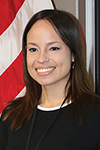Part 4 - HTS in Regulatory Services
Broadcast Date: March 31st | 10:30 am Central
View the Webinar
This webinar is part of the upcoming APS 2021 special session Technology Transfer: From The Lab To The Diagnostician's Bench. The webinars emphasize on use and application of HTS in diagnostics and beyond. Professionals from various sectors involved in detecting pathogens and pests and delivering diagnostic results to prevent, monitor, and manage plant problems will benefit from attending. Plant diagnostics need to be supported by validated methods to underpin scientific credibility to the ever-changing environment that our stakeholders encounter. Timely and successful implementation of accurate diagnostics methods is a crucial part of any surveillance system for plant disease and, ultimately, food security derived from healthy plants.
Webinar Summary
The USDA-APHIS is a multi-faceted agency with a broad mission area that includes protecting and promoting U.S. agricultural health, regulating certain organisms developed using genetic engineering (modified organisms), administering the Animal Welfare Act, and carrying out wildlife damage management activities. In this webinar, how two different APHIS programs are using HTS technologies to protect the health and value of American agriculture will be discussed.
The Plant Germplasm Quarantine Program (PGQP) is the largest quarantine program in the U.S. and is the first line of defense against the entry and establishment of foreign pathogens. An overview of how PGQP uses HTS technologies as a diagnostic tool to detect all pathogens present in imported germplasm will be presented. It will then be highlighted how the Biotechnology Regulatory Services (BRS) will accept HTS data from modified plants under its new SECURE rule. The HTS data submission is an option for developers to support the application for a regulatory exemption or a regulatory status review. The goal of BRS is to protect plant health by regulating certain modified organisms that may pose plant pest risks by conducting risk and environmental assessments of these organisms and products.
The Canadian Food Inspection Agency (CFIA), Sidney Laboratory, also known as the Centre for Plant Health, is Canada's only post-entry quarantine, research and diagnostic facility for imported plant material. The laboratory is responsible for virus testing of all fruit-bearing trees, grapevines and small fruit (e.g. berries), in order to ensure the safe introduction of foreign plant material into Canada. Conventional testing based on a combination of molecular (PCR), enzymatic (ELISA) and bio-indexing (herbaceous and woody plant bioassays) have been the primary diagnostics tools used. A Sidney Laboratory infrastructure project, for completion by 2024, has been initiated to modernize testing. An overview of the genomics workflow utilizing HTS data that has been developed and validated to reduce the time and high costs associated with testing will be presented. How this method is being implemented in the short term, the ongoing restrictions and initiatives to harmonize the testing of import and exports with the industry development of a new domestic certification program headshop.
Meet the Presenters
 Dr. Martha Malapi-Wight is a plant pathologist by training with extensive experience working with regulated viral, bacterial, and fungal pathosystems relevant to U.S. agriculture. Her expertise is in genomics, functional genetics, and molecular diagnostics. Martha currently serves as Branch Chief in the USDA-APHIS-BRS Biotechnology Risk Analysis Programs. In BRS, she supports and serves as a subject matter expert on biotechnology regulations, especially regarding the molecular characterization of plants and microbes developed by genetic engineering using genomics tools. She also contributes to the implementation of the new SECURE rule for biotechnology regulations. Before joining BRS, she was the Lead Scientist and Program Manager of the USDA-APHIS Poaceae Quarantine Program. In this role, she was responsible for protecting several industries from importing and establishing foreign and exotic pathogens not present in the U.S. In this role, she implemented the HTS program and validated using this technology to identify novel and quarantine pathogens. Martha started her career in the Federal government in the USDA-ARS as a postdoc where she sequenced the genomes of multiple fungal emergent pathogens, providing fundamental information for risk assessments and the development of diagnostic assays. Martha holds a M.Sc. and Ph.D. in Plant Pathology from the University of Tennessee and Texas A&M, respectively.
Dr. Martha Malapi-Wight is a plant pathologist by training with extensive experience working with regulated viral, bacterial, and fungal pathosystems relevant to U.S. agriculture. Her expertise is in genomics, functional genetics, and molecular diagnostics. Martha currently serves as Branch Chief in the USDA-APHIS-BRS Biotechnology Risk Analysis Programs. In BRS, she supports and serves as a subject matter expert on biotechnology regulations, especially regarding the molecular characterization of plants and microbes developed by genetic engineering using genomics tools. She also contributes to the implementation of the new SECURE rule for biotechnology regulations. Before joining BRS, she was the Lead Scientist and Program Manager of the USDA-APHIS Poaceae Quarantine Program. In this role, she was responsible for protecting several industries from importing and establishing foreign and exotic pathogens not present in the U.S. In this role, she implemented the HTS program and validated using this technology to identify novel and quarantine pathogens. Martha started her career in the Federal government in the USDA-ARS as a postdoc where she sequenced the genomes of multiple fungal emergent pathogens, providing fundamental information for risk assessments and the development of diagnostic assays. Martha holds a M.Sc. and Ph.D. in Plant Pathology from the University of Tennessee and Texas A&M, respectively.
 Dr. Michael Rott obtained his degree in plant virology at the University of British Columbia, Canada in association with Agriculture Canada. As a postdoc he work on tree fruit viruses at the Julius Kuehn Institute in Germany before being hired by the Canadian Food Inspection Agency (CFIA) to set up a molecular testing laboratory for GM plants and products. He has worked as a plant pathologist, initially with Sudden Oak Death and Potato Cyst nematode, before returning to plant virology. He continues to work as a virologist at the CFIA post-quarantine entry facility in Sidney, B.C. Since 2010 his work has focused on plant viruses and virus-like diseases and includes the characterization of known and novel viruses of regulatory concern, and the development of better molecular detection tools to help prevent the introduction and spread of these diseases in Canada. Over the last several years his work has centered on the development and application of genomic tools, centered on high throughput sequencing for broad spectrum virus detection.
Dr. Michael Rott obtained his degree in plant virology at the University of British Columbia, Canada in association with Agriculture Canada. As a postdoc he work on tree fruit viruses at the Julius Kuehn Institute in Germany before being hired by the Canadian Food Inspection Agency (CFIA) to set up a molecular testing laboratory for GM plants and products. He has worked as a plant pathologist, initially with Sudden Oak Death and Potato Cyst nematode, before returning to plant virology. He continues to work as a virologist at the CFIA post-quarantine entry facility in Sidney, B.C. Since 2010 his work has focused on plant viruses and virus-like diseases and includes the characterization of known and novel viruses of regulatory concern, and the development of better molecular detection tools to help prevent the introduction and spread of these diseases in Canada. Over the last several years his work has centered on the development and application of genomic tools, centered on high throughput sequencing for broad spectrum virus detection.
